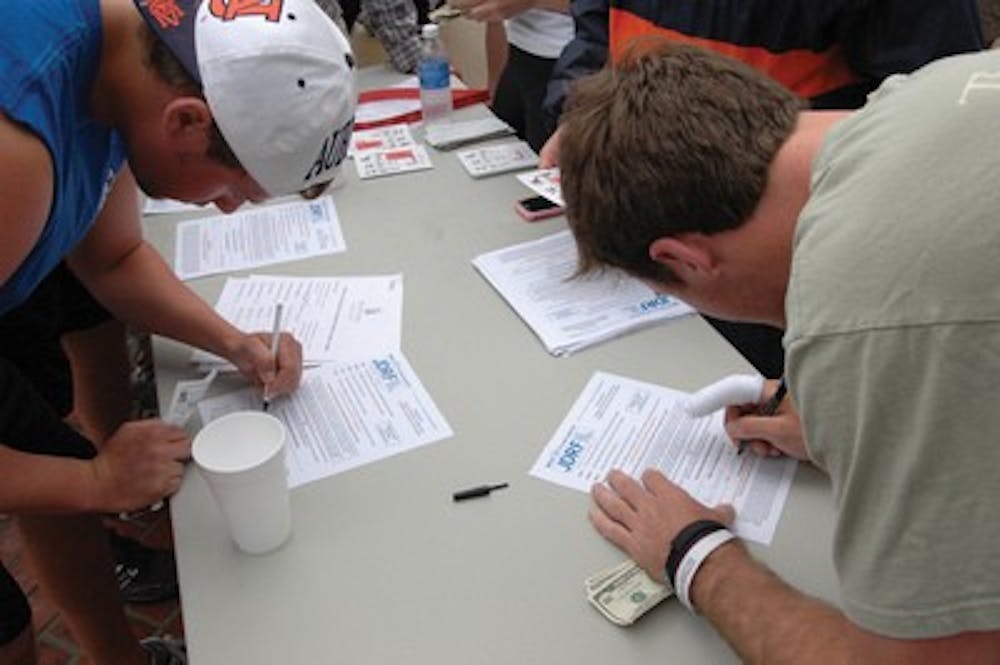The Cardinal Key National Honor Society for juniors and the REACH Community Connection, a community leadership program for freshmen, hosted the Walk to Cure Diabetes last Sunday.
All of the money donated from the walk goes to the Juvenile Diabetes Research Foundation, and according to their Web site, the organization is the leading charitable funder and advocate of type 1 juvenile diabetes research worldwide.
At pre-registration there were 150 participants signed up for the walk, and Clay Parker, Cardinal Key President, said he expected another 100 to 150 people to attend the walk.
Walk to Cure Diabetes consisted of a one mile walk, which began and ended on Cater Lawn. The route was approved back in January, but was changed because of construction. The route went up Samford Avenue, between the Goodwin and Dudley buildings, down through the Quad, Concourse, and back up to Cater Lawn.
Amanda Buchanan, the director of REACH, said this is the second year the program has partnered with Cardinal Key for the event.
"Some of the juniors in Cardinal Key last year were involved in REACH when they were freshman and since we are giving back to the community they asked us to help them co-sponsor the event," said Buchanan, a junior in pre-pharmacy. "This year we are partnering up with them again to help with the walk and publicize the event."
Last year Cardinal Key and REACH raised $800. With a goal of $1,000 this year, they had already raised $1,200 at pre-registration.
All of the money raised goes to JDRF, and from there, 85 percent of those funds goes directly toward research for the disease.
"Type 1 diabetes is the most costly, chronic illness in the U.S., and the numbers are expected to double in the next 20 years," said Parker, a junior in biomedical sciences.
Type 1 diabetes causes a person's pancreas to stop producing insulin--a hormone that enables people to get energy from food. Diabetes usually strikes in childhood, adolescence, or young adulthood, but lasts a lifetime. As many as 18 million Americans are affected by type 1 diabetes, with children representing half of those diagnosed each year.
According to JDRF's Web site, since its founding in 1970 by parents of children with type 1 diabetes, JDRF has awarded more than $1.3 billion to diabetes research, including more than $156 million in 2008.
Simone Alger, a senior in architecture, participated for the first time in Walk to Cure Diabetes. She walked partly because a friend asked her to and also because, as a member of Omega Phi Alpha, a service sorority, she finds it a priority to do things that benefit the community.
"My dad just got diagnosed with diabetes last year," Alger said. "It's not juvenile diabetes because he's obviously way too old for that, but I do have a friend who has juvenile diabetes, and so it's something that is really close to my heart."
As for participating in the walk next year, Alger said she would like to do it again.
Type 1 diabetes, previously known as juvenile diabetes, usually affects children and young adults but has been seen in adults as well.
According to the American Diabetes Association Web site, there are 23.6 million people in the United States, or 8 percent of the population, living with diabetes. Type 1 diabetes is serious, but people can live long, healthy, happy lives.
For more information on how to donate to JDRF, please contact the Auburn University Cardinal Key at http://www.auburn.edu/student_info/cardinal_key/.
Do you like this story? The Plainsman doesn't accept money from tuition or student fees, and we don't charge a subscription fee. But you can donate to support The Plainsman.





